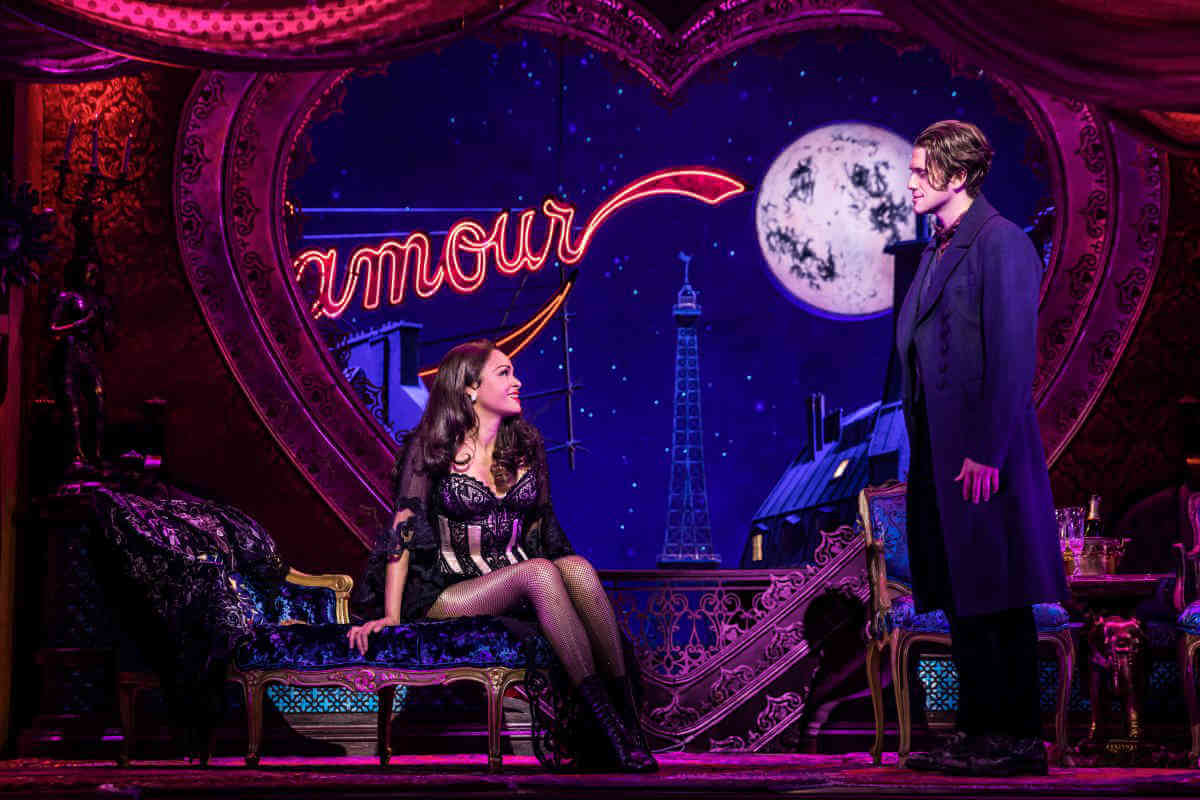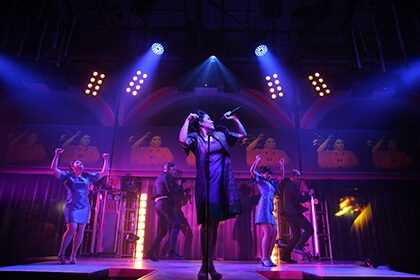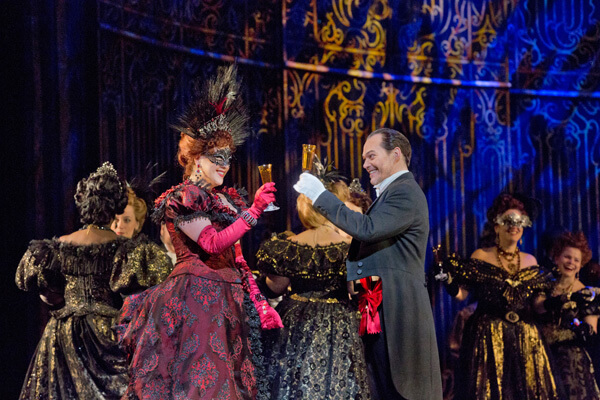One quickly runs out of superlatives in trying to describe “Moulin Rouge,” the new Broadway spectacle that has overwhelmed the Al Hirschfeld Theatre and is likely to be there for a very long time. The theater has been transformed into a stylized version of the famous nightclub, and the audience is transported to fin de siècle Paris for a tale of passion, innocence, and tragic love straight out of “La Bohème” or “La Traviata,” complete with the ominous foreshadowing coughs. It’s all done to a score that brilliantly knits together nearly 70 chart-topping pop songs, redefining and raising to stratospheric heights the bar for so-called “jukebox musical.”
As Oscar Wilde said, “nothing succeeds like excess,” and this show is all excess. From Derek McLane’s blazing red sets to Catherine Zuber’s inspired period costumes that combine historical accuracy with a genius for cut, color, and design, not to mention a lot of erotic apparel on the performers at the club. Justin Townsend’s lighting and, most importantly for a show of this nature, Peter Hylenski’s precise sound design make this the most dazzling, eye-popping extravaganza to hit Broadway in a long time. Yet, just at the point one is nearly overstimulated with a surfeit of color and action, the piece shifts into intimacy and a nearly monochromatic design. It doesn’t just give the eye a rest before the next burst of extravagance, it provides texture and depth for the story.
That’s also largely due to Alex Timbers’ exquisite direction that hasn’t missed a detail or left a moment unfilled. As with “Beetlejuice,” “Rocky,” and “Here Lies Love,” Timbers is a master at creating a world and inexorably drawing in the audience.
Perhaps, though, what makes this show such a consistent pleasure is that for all of its excesses, it doesn’t take itself too seriously. In other jukebox musicals, songs seem to be shoehorned into the show, but, here, John Logan’s deceptively simple book seamlessly integrates them, effectively winking at the audience. So, when Katy Perry, “Lady Marmalade,” and even the title song from “The Sound of Music” pop in, we’re all in on the joke.
The entire company is a marvel, both in singing and in performing Sonya Tayeh’s athletic, sensual choreography. In the principal roles, Karen Olivo as Satine, the nightclub’s headliner, plays the full range of a role that is chock-full of melodrama — from virtually selling herself to the evil Duke of Monroth to save the theater to her show-must-go-on dedication to have her young lover Christian’s music heard even as consumption is killing her. Yet Olivo’s performance is grounded in an emotional truth that makes it all work.
Tam Mutu as the Duke is the quintessential bad guy, an irresistible mix of sex and danger. Danny Burstein, as Harold Zidler, the manager of the club, deftly balances the character’s exuberant and audacious on-stage persona with a softer more human side. Sahr Ngaujah as Toulouse-Lautrec and Ricky Rojas as Santiago are strong, and each has his moments as they create the show-within-the-show that will hopefully save the club.
Aaron Tveit as Christian deftly plays the doe-eyed innocent, newly awakened to consuming passion. His voice has matured beautifully, and he has never sounded better, with flawless technique no matter what the style of the song. He is, in a word, electric.
In the end, “Moulin Rouge” is all about that electricity. It is unabashedly crowd-pleasing, luscious, and lusty, and if you ever had fantasies of dabbling in the demimonde that crowd is waiting for you on West 45th Street.
I’ve long been a fan of Rita Rudner’s mordant, observational comedy. She has a knack for seeing the absurd in the quotidian, and her barbs are always delivered with a kind of weaponized sweetness. She knows how to make us laugh at ourselves. That talent has been directed into the new musical “Two’s a Crowd,” now at 59E59. Like Rudner, who wrote the book with Martin Bergman, the show is charming, funny, and pointed.
The “meet-cute” premise is that Wendy and Tom, two emotionally adrift middle-aged people, are double booked in a Vegas hotel and decide, grudgingly, to make the best of it. They start as combatants, and, as these plots typically go, the rollaway bed, well, rolls away. That it’s reminiscent of comedies of the 1960s and ‘70s actually works in its favor, and there’s a kind of innocent naughtiness throughout, punctuated by Rudner’s jokes. Wendy who is escaping an unfaithful husband starts out angry. Yet she softens as she learns about how Tom lost his wife and is participating in poker tournaments. It’s all done with such good humor and lots of comic bits from director Bergman, that the familiarity breeds delight.
The music and lyrics by Jason Freddy, who leads the band and delivers some of the songs as commentary, are stylistically diverse — traditional show tunes, rock, country — and fit in well with the tenor of the show. Ruder as Wendy and Robert Yacko as Tom are well-matched and fun to watch, and they’re ably abetted by Kelly Holden Bashar and Brian Lohmann in a variety of smaller roles. “Two’s A Crowd” has no pretensions of seriousness, but it has a lot of heart. It is the very definition of light summer fun.

That’s not the case with “Coriolanus,” now finishing up its run at Shakespeare in the Park. Shakespeare’s most political play is almost unrelievedly dense. It is also extremely timely, which is why Daniel Sullivan’s muscular production is fascinating and epic. It is a story of power, ego, revenge, and class warfare, and Coriolanus’s tragedy is that he doesn’t know when to stop fighting. A Roman war hero, he is nonetheless banished from Rome when he attempts to rob the people of their voice. Angry, yet undaunted, he turns to his former enemy, the Volscians, to seek revenge on Rome. He is persuaded by his mother, the canny, political powerhouse Volumnia, to spare the city and restore peace, but in doing so Coriolanus must betray the Volscians, who in turn murder him.
In the food riots that open the play, the central conflict between the patricians and the plebeians emerges, and the story raises issues of income equality, economic manipulation, the blind egoism of a leader whose loyalties are completing self-serving, and the hatred of the “other.” Coriolanus is deaf and blind to anything that challenges his worldview — and that is his undoing.
Sullivan’s direction is clear and straightforward, making it often feel like an action-packed Avengers movie. “Coriolanus” doesn’t have the character development or nuance of Shakespeare’s other history plays, so the pace largely works to the production’s advantage, though it does bog down a bit in the second act when it becomes static and talky.
Jonathan Cake is powerful in the title role, the quintessential anti-hero channeling The Hulk. His answer to every obstacle is to smash through it — or attempt to. His mother Volumnia, played by Kate Burton in a bravura performance of ferocity and focus, is the only one who can tame Coriolanus. When Volumnia chastises Coriolanus, Cake plays like the conventional cowed bully from a sitcom — a gag that always gets a laugh but is cartoonish and unnecessary. Louis Cancelmi plays Tullus Aufidius, Coriolanus’ enemy-friend-enemy who is the ultimate victor because he’s the more strategic thinker. Cancelmi and Cake play very well together, amplifying Coriolanus’ fatal flaws. Jonathan Hadary and Enid Graham are maliciously wonderful as the tribunes who, elected by the people, manipulate them to reject Coriolanus. The self-serving cynicism of these characters is fascinating and adds to the tension of the play, suggesting the plebeians may be as vulnerable to corrupting forces as the patricians.
Beowulf Boritt’s dystopian set is a fairly obvious choice, all empty oil drums and corrugated metal, but it serves the piece well, and Japhy Weideman’s murky lighting gives the production a Cormac McCarthy feel. Kay Voyce’s costumes echo the very contemporary conceit that in the post-apocalyptic world everyone will wear distressed sweats in one form or another.
As agitprop and a condemnation of the current political scene, this “Coriolanus” is far more compelling — and damning — than the Public’s 2017 production of “Julius Caesar” that prompted nationwide right-wing backlash as a more literal representation of Donald Trump. Knee-jerk outrage, of course, is not about delving too deeply into complex issues. It’s about ego and emotional fireworks, both of which prove to be Coriolanus’ undoing. For those constitutionally incapable of learning from history, that’s a wasted lesson.
MOULIN ROUGE! THE MUSICAL | Al Hirschfeld Theatre, 302 W. 45th St. | Tue.-Wed., Sun. at 7 p.m.; Thu.-Sat. at 8 p.m.; Thu., Sat. at 2 p.m. | $99-$399 at ticketmaster.com or 800-745-3000 | Two hrs., 35 mins, with intermission
TWO’S A CROWD | 59E59 Theaters, 59 E. 59th St. | Through Aug. 25: Tue.-Sat. at 7 p.m.; Sat.-Sun. at 2 p.m. | $55-$70 at 59e59.org or 646-892-7999 | One hr., 25 mins, with no intermission
CORIOLANUS | The Public Theater, Delacorte Theater, Central Park | Aug. 8-11 at 8 p.m. | Free; tickets at publictheater.org | Two hrs., 45 mins, with intermission

































